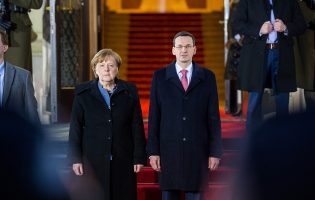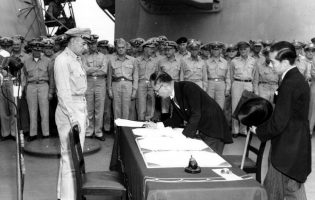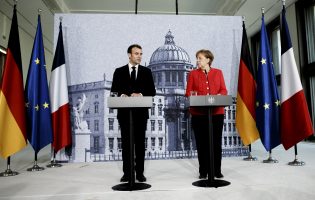
Germany’s Confrontation with Its Colonial History: Are There Lessons from Grappling with the Nazi Past?
The anti-immigrant riots in Chemnitz at the end of August 2018 with their expressions of hate, intolerance, and xenophobia, including Nazi salutes, have led observers to question the depth of …

Do Disputes over History Define German-Polish Relations?
Three recent or upcoming events remind us of the centrality of history in the German-Polish partnership: foreign minister Heiko Maas’ visit to Auschwitz on August 20, the 79th anniversary of …

Memory, Identity, and Commemorations of World War II
Anniversary Politics in Asia Pacific Edited by Daqing Yang and Mike Mochizuki Why do some governments and societies attach great significance to a particular anniversary year whereas others seem less …

The Robustness of Franco-German Relations in an Unstable Europe
The European Union faces an existential crisis of dramatic proportions, occasioned by Brexit; nationalism and populism in several member states; internal sclerosis; and challenges from a chaotic international system created …

Are German-Israeli Relations Still “Special?” A Response to Ambassador Shimon Stein
Shimon Stein’s essay on the complex relationship between Germany and Israel is both penetrating and provocative. As Israel approaches the 70th anniversary of the state’s founding on May 14, it …

A New Strategy for How the History of Nazism and the Holocaust Can Be Remembered by German, Israeli, and American Youth
Four factors make urgent the necessity of German, Israeli, and American youth actively remembering Germany’s history of Nazism and the Holocaust. First, in both Germany and the U.S., there have …

Europe’s Illusions
Although for more than 70 years common values were invoked to keep the transatlantic partnership together, now is the time to assert shared U.S.-German interests.

German-Greek Relations: A Recipe for Reconciliation?
In the March 2017 negotiations over Greece’s bailout review, Germany persisted in its two-pronged approach of rejecting international debt relief and insisting on domestic austerity. This stringent stance in the …

The Limits and Opportunities of Reconciliation with West Germany During the Cold War: A Comparative Analysis of France, Israel, Poland, and Czechoslovakia
The seventieth anniversaries in 2015 of the end of World War II and the Holocaust have generated renewed interest in reconciliation and the question of whether the German and European experience holds lessons for Japan and East Asia. Much of the thinking on comparative lessons, developed in the last fifteen years, has focused on an idealized notion of Germany’s successful international reconciliation.

A New Kind of Reconciliation in East Asia?
President Obama noted in an interview with the Asahi Shimbun before his visit to Hiroshima that his presence was an example of reconciliation: “I will point out that Prime Minister …

History and Memory in German-Israeli Relations: Varieties of Expression
May and June mark two important anniversaries in Germany’s postwar rebuilding and return to the community of nations: the end of World War II in Europe and the beginning of …

Die Bedeutung zivilgesellschaftlicher und staatlicher Institutionen: Zur Vielfalt und Komplexität von Versöhnung
Versöhnung – verstanden als ein Prozess der Umwandlung von Feindschaft in Freundschaft und der Aufarbeitung einer unmittelbaren deutschen Vergangenheit von Barbarei, vielfachen Kriegsverbrechen im Zweiten Weltkrieg und dem Holocaust – …




